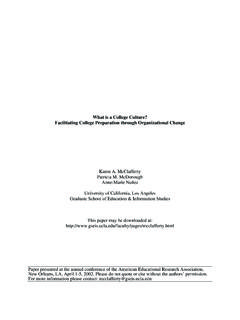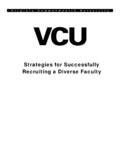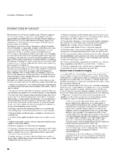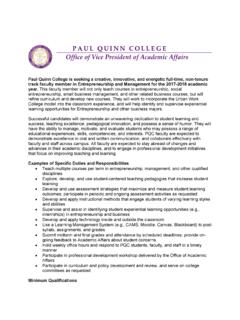Transcription of Policy on Conflicts of Interest and Interactions …
1 Policy on Conflicts of Interest and Interactions between Representatives of Certain Industries and faculty , staff and students of the Schools of the Health Sciences and Personnel Employed by UPMC at all Domestic Locations Date Issued: November 12, 2007 Effective Date: February 15, 20081 The University of Pittsburgh Schools of the Health Sciences (collectively SOHS ) and the domestic locations of the University of Pittsburgh Medical Center ( UPMC ) share a goal to improve the health of the public through the creation and dissemination of knowledge about the mechanisms and treatment of human disease, and to employ this knowledge in the delivery of effective and efficient clinical care. This shared mission requires that faculty , students , trainees, and staff of the SOHS and physicians and other UPMC employees at all domestic locations interact with representatives of the pharmaceutical, biotechnology, medical device, and hospital equipment supply industry (hereinafter Industry )2 , in a manner that advances the use of the best available evidence so that medical advancements and new technologies become broadly and appropriately used.
2 While the interaction with Industry can be beneficial, Industry influence can also result in unacceptable Conflicts of Interest that may lead to increased costs of healthcare, compromise of patient safety, negative socialization of students and trainees, bias of research results, and diminished confidence and respect among patients, the general public and regulatory officials. Because provision of financial support or gifts, even in modest amounts, can exert a subtle but measurable impact on recipients behavior, the SOHS and UPMC have adopted the following Policy to govern the Interactions between Industry and SOHS and UPMC personnel. There is a growing body of evidence demonstrating the adverse consequences of Interactions between healthcare providers and Industry, 3 including practices such as receipt of small gifts, that have traditionally been considered acceptable by professional standards, such as the ethical opinions of the American Medical Association s Council on Medical and Judicial Affairs.
3 While healthcare professionals may not believe that they are personally biased by Industry4 , detailing by Industry representatives is designed to sell products and advance the interests of Industry s shareholders. This Policy has been designed on the basis of the best available literature on conflict of Interest and is intended to provide a set of guiding principles that members of the SOHS and UPMC communities as well as representatives of Industry can use to assure that their Interactions result in optimal benefit to clinical care, education and 1 The section regarding samples as originally drafted deferred to UPMC to develop a more definitive process. This section was updated to reflect the UPMC Policy and procedure adopted in January 2015. 2 While potential for conflict also exists with respect to Interactions with other vendors (for example, providers of research equipment or laboratory supplies), existing policies, such as University Policy No.
4 05-02-02, Conflict of Interest and Procurement Relationships, the University Code of Ethics, Policy No. 05-02-03, and UPMC Policy on Conflict of Interest No. HS-LE-0002, apply to such Interactions . 3 See, , Brennan TA, Rothman DS, Blank L, Blumenthal D, et al., Health Industry practices that create Conflicts of Interest : a Policy proposal for academic medical centers. JAMA 2006; 295:429-33. Dana J, Lowenstein G, A social science perspective on gifts to physicians from Industry. JAMA 2003; 290:252-2; Chren MM, Landefeld CS, Physicians behavior and their Interactions with drug companies: a controlled study of physicians who requested additions to a hospital drug formulary. JAMA 1994; 271:684-9. 4 This may explain the apparent pervasiveness of such relationships, particularly in some fields. See Campbell EG, Green R, et al. A National Survey of Physician-Industry Relationships, N Engl J Med 2007; 356:1740-1750. 2 research, and maintenance of the public trust. This Policy is designed to affect the behavior and practices of Industry, as much as the behavior of University and UPMC personnel.
5 While valuable and meaningful Interactions between Industry and academic medical centers can occur, the provision of gifts, food, or other blandishments add nothing to the substance of the exchange, and leave both parties subject to questions of integrity and commitment to professional practice responsibilities. A. Scope of Policy This Policy applies to all faculty , staff , and students of the SOHS, and to all healthcare professionals and staff employed and/or contracted by domestic locations of UPMC, and to all facilities owned or controlled by the SOHS and all clinical facilities owned or controlled by UPMC. While this Policy addresses many aspects of Industry interaction, it supplements the existing conflict of Interest policies of the University of Pittsburgh, particularly as they apply to research Conflicts of Interest : Policy on Outside Employment: Conflict of Interest Policy for faculty , Scholars, Researchers, Research Coordinators/ staff Policy on Conflict of Interest and Procurement Relationships: This Policy also supplements existing UPMC policies, including but not limited to: UPMC Conflict of Interest Policy No.
6 HS-LE-0002 UPMC Guidelines for Purchasing Policy No. HS-MM-0300 In all cases where this Policy is more restrictive than a University or UPMC conflict of Interest Policy , this Policy shall control. This Policy applies to Interactions with all sales, marketing, or other product-oriented personnel of Industry, including those individuals whose purpose is to provide information to clinicians about company products, even though such personnel are not classified in their company as sales or marketing. B. Statement of Policy It is the Policy of the SOHS and UPMC that clinical decision-making, education, and research activities be free from influence created by improper financial relationships with, or gifts provided by, Industry. For purposes of this Policy , Industry is defined as all pharmaceutical manufacturers, and biotechnology, medical device5 , and hospital equipment supply industry entities and their representatives. In addition, clinicians and their staffs should not be the target of commercial blandishments or inducements great or small the costs of which are ultimately borne by our patients and the public at large.
7 These general principles should guide all potential relationships or Interactions between SOHS and UPMC personnel 5 For purposes of this Policy , the definition of medical devices will follow the definition and any available guidance related thereto of the Federal Safe Medical Device Act of 1990, as amended, (21 CFR , ). 3 and Industry representatives. The following specific limitations and guidelines are directed to certain specific types of Interactions . For other circumstances, SOHS and UPMC personnel should consult in 3 advance with their deans or department chairs (in the case of the SOHS faculty and personnel) or their administrators (in the case of UPMC personnel) to obtain further guidance and clarification. Charitable gifts provided by industry in connection with fundraising done by or on behalf of UPMC or SOHS shall be subject to other policies adopted from time to time by UPMC, SOHS or foundations fundraising on their behalf.
8 C. Specific Activities 1. Gifts and Provision of Meals SOHS and UPMC personnel shall not accept or use personal gifts (including food) from representatives of Industry, regardless of the nature or dollar value of the gift. Although personal gifts of nominal value may not violate professional standards or anti-kickback laws, such gifts do not improve the quality of patient care, may subtly influence clinical decisions, and add unnecessary costs to the healthcare system. Gifts from Industry that incorporate a product or company logo on the gift ( , pens, notepads or office items such as clocks) introduce a commercial, marketing presence that is not appropriate to a non-profit educational and healthcare Meals or other hospitality funded directly by Industry may not be offered in any facility owned and operated by the SOHS or UPMC. SOHS and UPMC personnel may not accept meals or other hospitality funded by Industry, whether on-campus or off-campus, or accept complimentary tickets to sporting or other events or other hospitality from Industry.
9 Modest meals provided incidental to attendance at an off-campus event that complies with the provisions of subsection 6, below, may be accepted. Industry wishing to make charitable contributions to the SOHS or UPMC may contact the Medical and Health Sciences Foundation or other charitable foundations legally organized to support UPMC hospitals or other UPMC entities. Such contributions shall be subject to any applicable policies maintained by UPMC, SOHS, and the receiving organizations. 2. Consulting Relationships. The SOHS and UPMC recognize the obligation to make the special knowledge and intellectual competence of its faculty members available to government, business, labor, and civic organizations, as well as the potential value to the faculty member, the University, and UPMC. However, consulting arrangements that simply pay SOHS or UPMC personnel a guaranteed amount without any associated duties (such as participation on scientific advisory boards that do not regularly meet and provide scientific advice) shall be considered gifts and are consequently prohibited.
10 In order to avoid gifts disguised as consulting contracts, where SOHS or UPMC personnel have been engaged by Industry to provide consulting services, the consulting contract must provide 6 This provision does not prohibit acceptance of items bearing Industry logos provided as part of an off-site educational program (such as a meeting of a professional society), including name tag lanyards, totes, etc., where the items are provided incidental to attendance, the items are of nominal value, and the items are not used on UPMC or University premises. 4 specific tasks and deliverables, with payment commensurate with the tasks assigned. All such arrangements between individuals or units and outside commercial interests must be reviewed and approved prior to initiation in accordance with appropriate University or UPMC policies. For SOHS personnel, consulting relationships with Industry may be entered into only with the prior permission of a faculty member s dean, department chair (in the case of the SOHS faculty ), or administrator.





